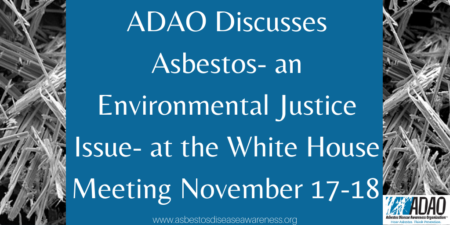Posted November 16, 2021
On November 17-18 there will be a White House Environmental Justice Advisory Council (WHEJAC) public meeting where individuals can submit written comments or speak publicly on topics related to current and historic environmental injustices, including asbestos, which has a disproportionate impact on our most vulnerable communities, especially communities of color and lower income communities who are often subjected to work exposure and higher rates of exposure to legacy asbestos. If you wish to participate, be sure to register here! 
The WHEJAC was established through President Biden’s Executive Order 14008. We are encouraged by President Biden’s actions to make sure there is a chance for public comments.
Environmental justice issues and crimes impact Americans in a myriad of ways, including through exposure to toxic chemicals, causing diseases, suffering, and death.
Asbestos, a known human carcinogen, is responsible for one of the largest man-made disasters. Over 15 years ago, I watched my husband, Alan, slowly and painfully die from mesothelioma, a preventable asbestos-caused cancer. Alan died with our then 13-year old daughter and me by his side. We are not alone. Each year, over 40,000 Americans die from mesothelioma and other asbestos-caused cancers. It often takes 10-50 years from exposure for an asbestos-caused disease to present symptoms.
The science is abundantly clear — there is no safe level of exposure to asbestos. Along with so many other toxic substances, asbestos contributes to environmental racism. Black, brown, indigenous, and lower-wealth communities have disproportionately been the dumping grounds for our country’s deadliest toxic chemicals and pollutants, such as asbestos. People in these communities are also more likely to live in older houses that contain asbestos, attend deteriorating schools that were built using asbestos (and have yet to be properly renovated), and work in industries with high asbestos exposure and cancer risks. The people in these communities often do not have the time or resources to fight against these injustices or hire lawyers to bring their case to court, which companies know and take advantage of this vulnerability.
Without an asbestos ban, companies continue to legally import hundreds of tons of raw asbestos and contaminate consumer products, building materials, and other products that are found in homes, schools, workplaces, and on store shelves; legally killing thousands of Americans annually.
Nearly 70 other countries have banned asbestos, but the U.S. is not one of them.
We are hopeful that President Biden will take public health seriously, and take the necessary steps to ban asbestos from the U.S. once and for all.
Together, let’s make change happen.
Linda Reinstein
Social Networks
